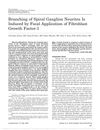Search
forLearn
5 / 7 resultslearn Hair Multiplication
extract, clone, and reinsert your own hair cells
learn Stem Cell Factor
learn Neem Oil
natural substance from Neem tree with medicinal and pesticidal properties
learn Rapamycin
mTOR regulator and immunosuppressant used more recently for anti-aging and hair regrowth
Research
5 / 1000+ resultsresearch Epidermal Growth Factor Upregulates Production of Supernumerary Hair Cells in Neonatal Rat Organ of Corti Explants
Epidermal growth factor increases extra hair cells in newborn rat ears.
research Defining the Cellular Environment in the Organ of Corti Following Extensive Hair Cell Loss: A Basis for Future Sensory Cell Replacement in the Cochlea
The conclusion is that genetic differences affect how the cochlea heals after hair cell loss, which may challenge the creation of hearing loss treatments.

research Branching of Spiral Ganglion Neurites Induced by Focal Application of Fibroblast Growth Factor-1
FGF-1 causes spiral ganglion neurites to branch more.

research Neuroendocrinology of the Hair Follicle: Principles and Clinical Perspectives
Hair follicles are hormone-sensitive and involved in growth and other functions, with potential for new treatments, but more research is needed.

research Rps14 Upregulation Promotes Inner Ear Progenitor Proliferation and Hair Cell Regeneration in the Neonatal Mouse Cochlea
Increasing Rps14 helps grow more inner ear cells and repair hearing cells in baby mice.
Community Join
5 / 280 resultscommunity Youre missing something in your battle against hairloss.
Moringa extract and oil are suggested to help with hair loss, with some users combining it with treatments like minoxidil, finasteride, and dutasteride. Moringa is claimed to improve hair growth and health, but evidence is mostly anecdotal.
community Quit vaping/smoking = 80% less loss
Quitting vaping significantly reduced hair loss for a user who was a heavy vaper and also taking finasteride. Some participants suggest nicotine's vasoconstrictive properties may worsen hair loss, while others share personal anecdotes of hair improvement after quitting smoking or vaping.
community How is it that golden era bodybuilders kept their hair while blasting gear while in the modern era most are bald? I’m convinced there’s something in our food and water causing MPB to speed up
The conversation is about the difference in hair loss between bodybuilders in the "Golden Era" and modern bodybuilders. Some users speculate that factors such as the types and doses of steroids used, genetics, diet, microplastics, and overall health may contribute to hair loss. Hair loss prevention medication and transplants are mentioned as potential treatments.

community Compressed part of research of theory of androgenic/anabolitic balance. AGA h-responders analytic. Theory of physio-metabolitic method of anti AGA treatment
The treatment for androgenetic alopecia involves using finasteride and minoxidil with intense exercise and cold exposure to boost metabolism and reduce androgenic effects, potentially leading to hair regrowth. This approach may activate biological pathways for improved hair and overall health.
community Table of the relationship between physical exercise and the regeneration of the deminiaturized hair follicle
Exercise, especially leg workouts, combined with finasteride and minoxidil, may enhance hair regrowth. Cold exposure, like cold showers, might further boost results.